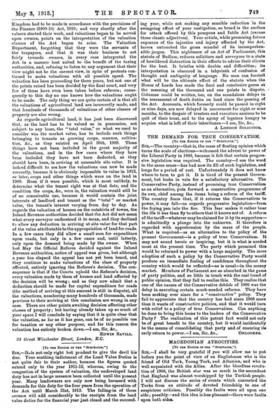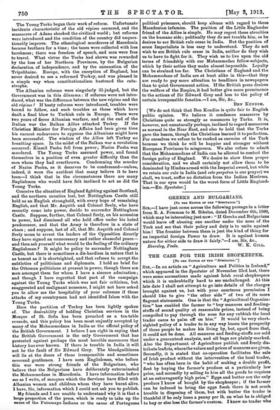MACEDONIAN ATROCITIES.
CrO THE EDITOR OF THE " SPECTITOR.1 SIR,—I shall be very grateful if you will allow me to put before you the point of view of an Englishman who is the friend of Old Turk, Young Turk, and Albanian, and who is well acquainted with the Allies. After the bloodless revolu- tion of 1908, the British star was so much in the ascendant that England was almost worshipped by the Turkish people. I will not discuss the series of events which converted the Turks from an attitude of devoted friendship to one of suspicious criticism. Possibly the faults were all upon one side ; possibly—and this idea is less pleasant—there were faults upon both sides.
The Young Turks began their work of reform. Unfortunate incidents characteristic of the old regime occurred, and the massacres of Adana shocked the civilized world ; but reforms were introduced and the condition of the country did unques- tionably improve. The ethnological murderers of Macedonia became brothers for a time ; the taxes were collected with less harshness ; there was freedom of speech, and men were free to travel. What virtue the Turks had shown was rewarded by the loss of her Northern Provinces, by the Bulgarian declaration of independence, and by the annexation of the Tripolitaine. Europe, with the exception of England, has never desired to see a reformed Turkey, and was pleased in a simple way when constitutionalism hastened the cata- strophe.
The Albanian reforms were singularly ill-judged, but the Government was in this dilemma : if reforms were not intro- duced, what was the difference between the new regime and the old regime ? If hasty reforms were introduced, troubles were bound to follow, and such troubles as those which have dealt a final blow to Turkish rule in Europe. There were two years of fierce Albanian warfare, and at the end of the Italian war the Balkan Allies attacked Turkey. If the Christian Minister for Foreign Affairs had been given time his earnest endeavours to appease the Albanians might have been successful. The wisdom of the Allies left Turkey no breathing space. In the midst of the Balkan war a revolution occurred : Kiamil Pasha fell from power; Nazim Pasha was murdered. The Young Turks assumed power, and found themselves in a position of even greater difficulty than the men whom they had overthrown. Condemning the murder of Nazim Pasha, as it deserves to be condemned—unless, indeed, it were the accident that many believe it to have been—I think that in the circumstances there are many Englishmen who would have felt inclined to act as did the Young Turks.
Conceive the situation of England fighting against Scotland, and the northern counties lost, but Nottingham Castle still held as an English stronghold, with every hope of remaining English, and that Mr. Asquith and Colonel Seely, who have recently come into power, decide to surrender Nottingham Castle. Suppose, further, that Colonel Seely, on his accession to power, had dismissed all who held office under his hated predecessor, and that the Army is therefore in a state of chaos ; and suppose, last of all, that Mr. Asquith and Colonel
Seely mean to arrest the leaders of the Opposition directly they have signed an unnecessary and rather shameful peace—
and then ask yourself what would be the feeling of the ordinary Englishman P It might be policy to surrender Nottingham Castle, but there is sometimes a die-hardism in nature that is as honest as it is shortsighted, and that refuses to accept the subtleties of politicians and diplomats. I hold no brief for the Ottoman politicians at present in power, though there are men amongst them for whom I have a sincere admiration; and though I have regretted that part of the campaign against the Young Turks which was not fair criticism, but exaggerated and malignant nonsense, I might not have asked you to allow me the hospitality of your columns if these attacks of my countrymen had not identified Islam with the Young Turks.
Here the partition of Turkey has been lightly spoken of. The desirability of holding Christian services in the Mosque of St. Sofia has been preached as a tea-table crusade, and this policy has been most unjustly accepted by many of the Mohammedans in India as the official policy of the British Government. I believe I am right in saying that the British Government is the only Government that has protested against perhaps the most horrible massacres that history has ever known. If there is trouble in India it will not be the fault of Sir Edward Grey. The bloodguiltiness will lie at the doors of these irresponsible and sometimes reverend gentlemen. I have seen Englishmen, who before this war were strong friends of the Bulgarians, who believe that the Bulgarians have deliberately exterminated the Mohammedans in Macedonia. I have information before me as I write, of mosques which the Servians have filled with Albanian women and children whom they have burnt alive.
I have, Sir, information which I could not ask you to publish. My friends and I are unable to understand why it is that a large proportion of the press, which is ready to take up the cause of the Putumayo Indians or the cause of Portuguese political prisoners, should keep silence with regard to these Macedonian infamies. The position of the Little Englander friend of the Allies is simple. He may regret these atrocities on the humane side ; politically they do not trouble him, as he desires to see British rule cease in India. But the position of some Imperialists is less easy to understand. They do not wish to see British rule cease in India, neither do they wish us to have to fight for it. They wish us to live upon the old terms of friendship with our Mohammedan fellow-subjects, which by their action they make almost impossible. Loyalty can be strained too far. The Christians of England and the Mohammedans of India are at least alike in this—that they are ready to pay more attention to headlines in newspapers than to quiet Government action. If the British press desires the welfare of the Empire, it had better give more prominence to the actions of Sir Edward Grey and less to the policy of certain irresponsible fanatics.—I am, Sir,
BEN KENDIM.
[We do not think that Ben Kendim is quite fair to English public opinion. We believe it condemns massacres by Christians quite as strongly as massacres by Turks. It is, however, not unnaturally perhaps, inclined to regard massacres as normal in the Near East, and also to hold that the Turks gave the lesson, though the Christians learned it to perfection. For ourselves we refuse to be ranked as enemies of the Turk because we think he will be happier and stronger without European Provinces to misgovern. We also refuse to admit that the Mohammedans of India can be allowed to control the foreign policy of England. We desire to show them proper consideration, and we shall certainly not allow them to be dominated by Hindus armed with the Imperial sword, but while we retain our rule in India (and esto perpetua is our prayer) we shall, we trust, suffer no dictation from the Indian Moslems. That in our eyes would be the worst form of Little England- ism.—En. Spectator.]



















































 Previous page
Previous page